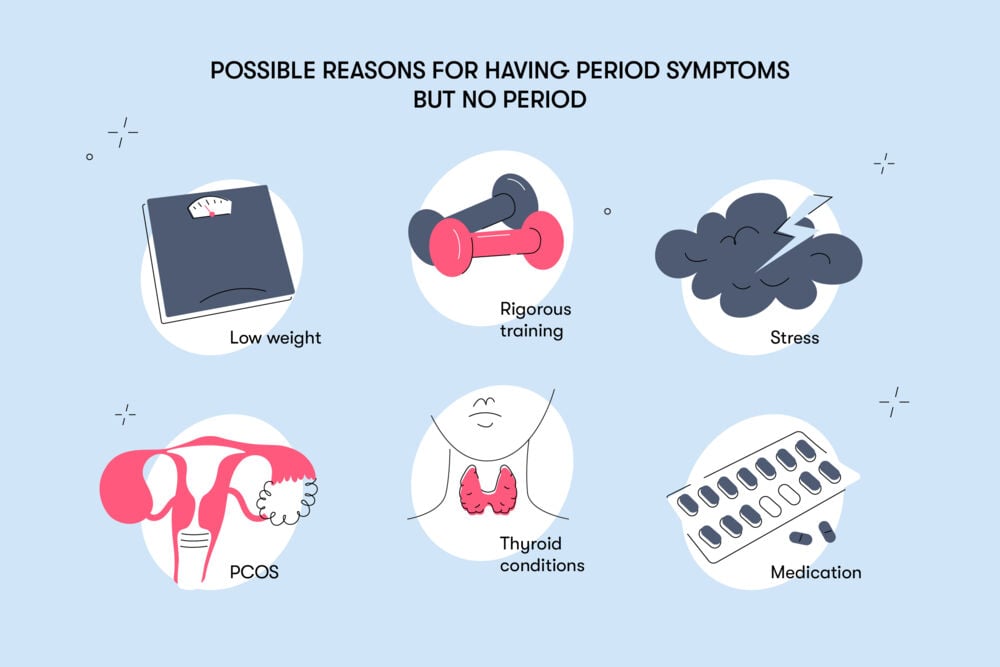If you have period symptoms but no period, you might be wondering what’s going on. In this article, we’re going to explore reasons for having period symptoms without menstruating.
-
Tracking cycle
-
Getting pregnant
-
Pregnancy
-
Help Center
-
Flo for Partners
-
Anonymous Mode
-
Flo app reviews
-
Flo Premium New
-
Secret Chats New
-
Symptom Checker New
-
Your cycle
-
Health 360°
-
Getting pregnant
-
Pregnancy
-
Being a mom
-
LGBTQ+
-
Quizzes
-
Ovulation calculator
-
hCG calculator
-
Pregnancy test calculator
-
Menstrual cycle calculator
-
Period calculator
-
Implantation calculator
-
Pregnancy weeks to months calculator
-
Pregnancy due date calculator
-
IVF and FET due date calculator
-
Due date calculator by ultrasound
-
Medical Affairs
-
Science & Research
-
Pass It On Project New
-
Privacy Portal
-
Press Center
-
Flo Accuracy
-
Careers
-
Contact Us
Why Do I Have Period Symptoms But No Period? Reasons for Cramps and Pain Without Menstruating


Every piece of content at Flo Health adheres to the highest editorial standards for language, style, and medical accuracy. To learn what we do to deliver the best health and lifestyle insights to you, check out our content review principles.
Period pains but no period: Could I be pregnant?
You've used Flo's online period calculator and know when you're due. All the signs of PMS arrive but then... there's no sign of your period. So, what's going on?
Period symptoms but no period might actually be a sign of pregnancy. This is because when the embryo implants into the uterine lining, cramping may occur. Following this, breast tenderness, headaches, fatigue, and more symptoms occur as the body begins going through various changes to carry the fetus. If you suspect this might be what you’re experiencing, watch for these signs of pregnancy.
A pregnancy test can detect pregnancy as early as 10 days after conception. But there are things that can make a positive urine home pregnancy test inaccurate, and here are some of them:
- Not following test instructions or misinterpreting the results
- Medications (aspirin, carbamazepine, and methadone)
- Blood or protein in the urine
It is also possible for a negative home urine test to be wrong:
- Taking a test too early or checking results too quickly
- Diluted urine (for a more accurate result, it is recommended to do the test in the morning when the concentration of hCG is highest)
- The “hook effect,” which is something that happens when there are so many hCG molecules in the urine that they prevent the test from working properly. They are simply washed off the test, so the result will be negative.
However, the absence of menstruation doesn’t necessarily mean you’re pregnant. There are lots of things that can cause period symptoms like cramps without actually having periods.
Causes of period symptoms without menstruating
Premenstrual symptoms are common. In fact, about 90 percent of women state they experience cramps, bloating, headaches, fatigue, moodiness, tender breasts, and difficulty sleeping before their periods. So it makes sense for you to assume you’re about to get your period when you have these symptoms. But what if you experience moodiness, breast tenderness, bloating, or cramps, but no period? Is it simply a delayed period, or is it something else?
Rigorous training
This is most common for female athletes. According to studies, the risk of developing menstrual irregularities is three times higher for people who are involved in competitive sports. This is especially true among long-distance runners. A 2010 study of 87 women found that frequent, intense workouts affect the menstrual cycle. Around 50 percent of the participants who did intense training had menstrual cycle issues: 30 percent of them had a period delay, and 11 out of 17 long-distance runners didn’t get periods at all, a condition called amenorrhea.
Another study of 187 Norwegian long-distance runners found that almost a quarter of them had menstrual disturbances (from minor ones to amenorrhea).
Take a quiz
Find out what you can do with our Health Assistant
Low weight
Low body weight and body mass index (BMI) can also cause a missed period with some symptoms.
Menstrual irregularities and amenorrhea are both associated with eating disorders. Studies have shown that people with a low body weight — less than 85 percent of what’s considered a healthy BMI for them — are four times more likely to have menstrual problems.
According to one study, a sharp decrease in weight, especially in combination with stress, can lead to impaired ovulation and menstrual dysfunctions.

Stress
Even though stress is unfortunately common, it can have a major impact on health, wellness, and the menstrual cycle. A 2010 study of over 1,600 working women found that stress at work and in the family was associated with menstrual problems in around 60 percent of participants. And a 2015 study of 100 medical students aged 18 to 23 and a study on Taiwanese nurses found that high stress levels are associated with irregular menstrual periods.
Medications
There are certain medications that can also cause period symptoms, but no period. For instance, these medications affect hormone levels that can affect the menstrual cycle:
- Hormonal contraceptives
- Hormonal medication for endometriosis treatment (leuprolide)
Hormonal birth control, such as the pill or injection, contains synthetic hormones that help regulate your cycle and prevent pregnancy. If you’ve recently started taking a new form of birth control, it might take your body some time to adjust. Usually, this adjustment period lasts from a few weeks to several months. During this time, it’s common to skip a period, experience irregular periods, and have period symptoms without menstruation. Additionally, when you’re coming off birth control, you may experience similar effects.
And here are some drugs that can disrupt the menstrual cycle as a side effect:
- Recreational drugs
- Psychotropic medications (such as antidepressants)
- Blood pressure regulators (such as methyldopa)
- Anti-nausea medicine (such as metoclopramide)
Polycystic Ovary Syndrome (PCOS)
Polycystic Ovary Syndrome (PCOS) is a disorder associated with hormonal imbalances. PCOS can cause the body to produce more of male androgen hormones, which can cause various issues. One of them is difficulty regulating the menstrual cycle, resulting in skipped, irregular, or late periods.
If you suspect you might have PCOS (common symptoms include excess body hair, male pattern baldness, irregular periods, and acne), it’s important to see a health care provider for consultation.
Thyroid conditions
The thyroid gland regulates many metabolic and hormonal functions, including body temperature, heart rate, menstrual cycle, and more. But nutritional deficiencies, stress, autoimmune diseases, and other things can disrupt how the gland functions. There are two different conditions that might trigger menstrual disturbances: underactive and overactive thyroid.
Takeaway
It’s important to remember that having period symptoms but no period doesn’t necessarily mean you’re pregnant. There are a variety of reasons you might miss a period or experience a delayed period. Taking a home pregnancy test about five days after you were expecting your period can help you figure out what’s going on, as can listening to your body and the clues it’s giving you. From there, you can do what’s best for you, your health, and your life.


Hey, I'm Anique
I started using Flo app to track my period and ovulation because we wanted to have a baby.


The Flo app helped me learn about my body and spot ovulation signs during our conception journey.


I vividly
remember the day
that we switched
Flo into
Pregnancy Mode — it was
such a special
moment.
Real stories, real results
Learn how the Flo app became an amazing cheerleader for us on our conception journey.
References
Winer, Sharon A, and Andrea J Rapkin. “Premenstrual disorders: prevalence, etiology and impact.” The Journal of reproductive medicine vol. 51,4 Suppl (2006): 339-47.
Hillard, Paula Adams. “Menstrual suppression: current perspectives.” International journal of women's health vol. 6 631-7. 23 Jun. 2014, doi:10.2147/IJWH.S46680
“Pcos Research.” Center for Reproductive Health, Accessed Sept. 2021, crh.ucsf.edu/pcos-research.
Betz, Danielle and Kathleen Fane. “Human Chorionic Gonadotropin.” NCBI, StatPearls Publishing LLC, 11 August 2021, https://www.ncbi.nlm.nih.gov/books/NBK532950/
“Home pregnancy tests: Can you trust the results?” Mayo Clinic, Mayo Foundation for Medical Education and Research (MFMER), 24 February 2021, https://www.mayoclinic.org/healthy-lifestyle/getting-pregnant/in-depth/home-pregnancy-tests/art-20047940
De Souza, M J et al. “High prevalence of subtle and severe menstrual disturbances in exercising women: confirmation using daily hormone measures.” Human reproduction (Oxford, England) vol. 25,2 (2010): 491-503. doi:10.1093/humrep/dep411
Meczekalski, B et al. “Functional hypothalamic amenorrhea and its influence on women's health.” Journal of endocrinological investigation vol. 37,11 (2014): 1049-56. doi:10.1007/s40618-014-0169-3
Nagma, Shahida et al. “To evaluate the effect of perceived stress on menstrual function.” Journal of clinical and diagnostic research : JCDR vol. 9,3 (2015): QC01-3. doi:10.7860/JCDR/2015/6906.5611
Zhou, Mei et al. “Work and family stress is associated with menstrual disorders but not with fibrocystic changes: cross-sectional findings in Chinese working women.” Journal of occupational health vol. 52,6 (2010): 361-6. doi:10.1539/joh.l10057
Winkler, Laura Al-Dakhiel et al. “Body composition and menstrual status in adults with a history of anorexia nervosa-at what fat percentage is the menstrual cycle restored?.” The International journal of eating disorders vol. 50,4 (2017): 370-377. doi:10.1002/eat.22600
“Delaying your period with hormonal birth control.” Mayo Clinic, Mayo Foundation for Medical Education and Research (MFMER), 31 January 2020, https://www.mayoclinic.org/healthy-lifestyle/birth-control/in-depth/womens-health/art-20044044
DeSapri, Kristi. “Amenorrhea Clinical Presentation.” Medscape, WebMD LLC, 14 October 2019, https://emedicine.medscape.com/article/252928-clinical#b1
Fourman, Lindsay T, and Pouneh K Fazeli. “Neuroendocrine causes of amenorrhea--an update.” The Journal of clinical endocrinology and metabolism vol. 100,3 (2015): 812-24. doi:10.1210/jc.2014-3344
Huhmann, Kimberly. “Menses Requires Energy: A Review of How Disordered Eating, Excessive Exercise, and High Stress Lead to Menstrual Irregularities.” Clinical therapeutics vol. 42,3 (2020): 401-407. doi:10.1016/j.clinthera.2020.01.016
“Leuprolide Injection.” MedlinePlus, U.S. National Library of Medicine, 15 July 2020, https://medlineplus.gov/druginfo/meds/a685040.html
Ajmani, Nangia Sangita et al. “Role of Thyroid Dysfunction in Patients with Menstrual Disorders in Tertiary Care Center of Walled City of Delhi.” Journal of obstetrics and gynaecology of India vol. 66,2 (2016): 115-9. doi:10.1007/s13224-014-0650-0
Koyyada, Arun, and Prabhakar Orsu. “Role of hypothyroidism and associated pathways in pregnancy and infertility: Clinical insights.” Tzu chi medical journal vol. 32,4 312-317. 10 Apr. 2020, doi:10.4103/tcmj.tcmj_255_19
“Current evaluation of amenorrhea.” Fertility and Sterility, vol.90, no.3, 2008, pp. 219-225. American Society for Reproductive Medicine, https://www.asrm.org/globalassets/asrm/asrm-content/news-and-publications/practice-guidelines/for-non-members/current_evaluation_of_amenorrhea.pdf
Falsetti, L et al. “Weight loss and menstrual cycle: clinical and endocrinological evaluation.” Gynecological endocrinology : the official journal of the International Society of Gynecological Endocrinology vol. 6,1 (1992): 49-56. doi:10.3109/09513599209081006




